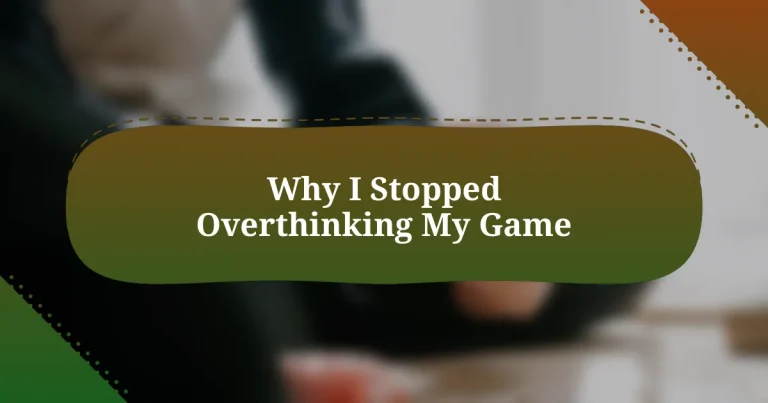Key takeaways:
- Overthinking in sports can hinder performance and joy, particularly when players become fixated on mistakes and fear of failure.
- Mental health is essential for young athletes, influencing their resilience and enjoyment of the game beyond just performance metrics.
- Common causes of overthinking include pressure to impress, fear of failure, and unhealthy comparisons to peers.
- Strategies like focusing on the process, visualization, and breathing exercises can help athletes combat overthinking and regain focus.
Understanding overthinking in sports
Overthinking in sports often creeps in when players become overly aware of their actions and the potential outcomes. I remember a time during a match when I was so fixated on not making mistakes that I lost sight of the joy of playing. Have you ever felt paralyzed by the fear of failure? It’s a common trap, especially for young athletes learning to navigate the competitive landscape.
When I focused too much on what my coach would say after a poor performance, I found myself second-guessing every decision on the field. Sports should be about instinct and flow. It’s crucial for young players to learn that making mistakes is part of the game; it’s how we improve. Can you think of a time when worrying about the end result held you back from performing your best?
Understanding overthinking is vital. It diminishes your ability to focus and enjoy the game. I’ve seen younger players get so caught up in worrying about what others think that they lose their natural playfulness. Instead of allowing the game to come to them, they grapple with thoughts racing through their minds. What if simpler, more direct thinking could lead to a much more enjoyable experience?
The importance of mental health
Mental health plays a crucial role in sports, especially for young athletes. I’ve seen firsthand how a positive mental outlook can transform not just performance, but the overall experience of playing. When I focused on maintaining a healthy mindset, I felt more resilient and free to take risks. Have you ever noticed how relaxed players seem to be, thriving in the moment without overthinking?
Every match is a blend of skills and emotional stability. I remember the time I let a mistake spiral into self-doubt, which affected my concentration for the entire game. It was then I realized how essential it is to foster mental well-being alongside physical training. How often do young athletes take time to check in with their mental state, just like they would their batting average?
Emphasizing mental health is not just about preventing overthinking; it’s about nurturing a passion for the sport. I’ve encountered young players who experienced burnout because they felt they had to perform perfectly. It’s vital for them to understand that their worth isn’t defined by a match score. How can we encourage the next generation to find joy and balance, while still performing?
Common causes of overthinking
Overthinking can stem from various pressures that young players face, such as the expectation to impress coaches or peers. I remember feeling this weight during practice; the voice in my head would nag me to achieve perfection with every swing of the bat. Have you felt that pressure too? It can create a cycle where instead of enjoying the game, you become trapped in your own thoughts.
Another common cause I’ve noticed is fear of failure. I vividly recall when I missed an easy catch during a match—my mind started running wild with “what if” scenarios. Instead of focusing on the next play, I fixated on my mistake, which only intensified my anxiety. How can we help young athletes shift their focus away from fear and back to their love for the game?
Lastly, comparisons to others can trigger overthinking. I often found myself evaluating my performance against my teammates, which led to self-doubt spiraling out of control. Seeing someone else hit a six made me question my own abilities, distracting me from my strengths. How can we create an environment where everyone values their unique contributions to the team?
Strategies to combat overthinking
One effective strategy to combat overthinking is to focus on the process rather than the outcome. When I began to concentrate on my technique and the enjoyment of playing, I felt a significant shift in my mindset. Have you ever noticed how freeing it can be to simply immerse yourself in each move rather than worrying about the game score?
Another approach is to engage in visualization techniques. I often close my eyes before a match and picture myself performing well—hitting the ball cleanly or making a great catch. It’s remarkable how this practice calms my nerves and builds confidence. Can you think of a time when visualizing success helped you feel more prepared?
Incorporating breathing exercises into your routine can be a game-changer, too. Just moments before stepping onto the field, I take a few deep breaths, focusing entirely on inhaling and exhaling. This simple act grounds me and clears my mind, allowing me to transition from worry to focus. Have you tried this technique when feeling overwhelmed? It might just help you re-center and enjoy the game again.
Personal experiences with overthinking
Thinking back, I remember a time when I let a bad game weigh heavily on my mind. I replayed every missed catch and poor decision, feeling like I was drowning in self-doubt. Have you ever felt paralyzed by your own thoughts, lost in a loop of what-ifs instead of focusing on the fun of the game?
One particular situation stands out. During a crucial match, I was so caught up in overthinking my every move that I dropped an easy catch. The embarrassment stung, but it also taught me a lesson: allowing my mind to wander turned potential success into pressure. Have you experienced a moment where overthinking turned excitement into anxiety?
I often find myself recalling how liberating it was when I finally shared my struggles with overthinking with my teammates. Their support reminded me that everyone faces these challenges, and it really took the weight off my shoulders. Isn’t it amazing how sharing our experiences can shift our perspective and bring us back to enjoying the game?


